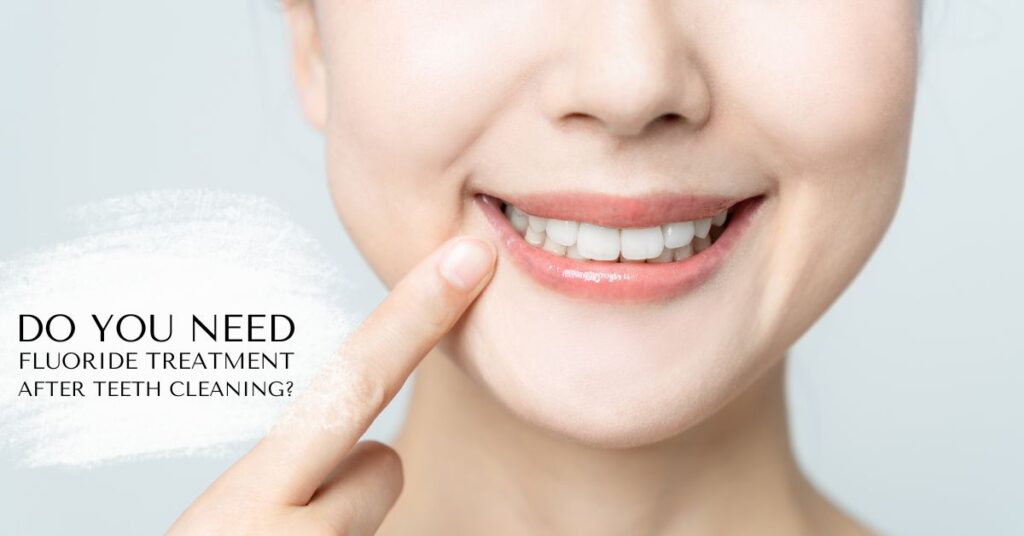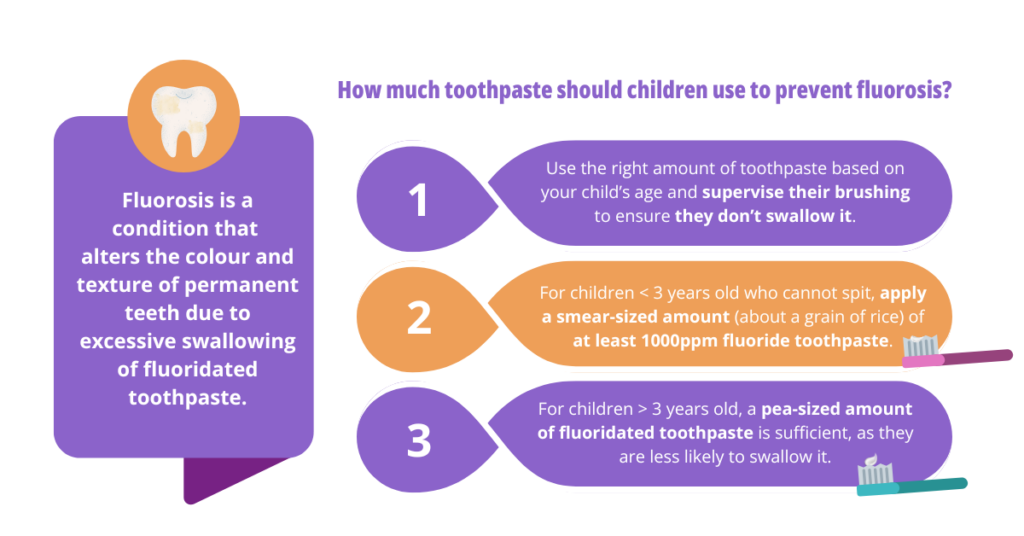Article reviewed by:
Dr Tan Kian Meng • Prosthodontist

When you visit your dentist for routine cleaning (scaling and polishing), you might be offered a fluoride treatment at the end of your session. Is it necessary? Let’s delve into the benefits of fluoride treatment to help you decide.
Table of Contents
What is fluoride treatment?
Fluoride is a naturally occurring mineral that helps strengthen tooth enamel and reduce the risk of cavities. In dentistry, fluoride treatment involves applying a concentrated fluoride solution, such as gel, foam, or varnish, directly to the teeth. This quick procedure provides extra protection against tooth decay, making it a valuable addition to routine oral care.
What are the types of fluoride treatment?
Topical fluoride
Topical fluoride is applied directly to the surface of your teeth, making it more resistant to decay. You’ve probably been using topical fluoride every day without even realising it.
Common sources of topical fluoride include:
- fluoride mouthwash – a great supplement to brushing, especially for those at higher risk of cavities.
- fluoride toothpaste – the easiest and most common way to get daily fluoride protection.
- in-clinic fluoride treatments (gels or foams) – applied by your dentist to provide an extra boost of protection.
Topical varnish

Fluoride varnish is a highly concentrated fluoride treatment that is professionally applied by a dental specialist or dentist. It comes in a sticky, quick-drying formula that adheres to the teeth, allowing the fluoride to be absorbed over several hours. Individuals who are at high risk of cavities or have sensitive teeth are encouraged to get fluoride varnish treatment during their routine dental cleaning.
Key benefits of fluoride varnish include:
- stronger protection – the high concentration provides long-lasting fluoride exposure.
- quick and easy application – the varnish is painted onto the teeth in just a few minutes.
- great for children and high-risk patients – helps protect developing teeth and those who are more prone to cavities.
Why is fluoride important?
Fluoride helps:
- remineralise weakened enamel.
- reduce risk of cavities by enhancing resistance to acid attacks.
- reduce tooth sensitivity.
- protect exposed tooth roots in patients with gum recession.
Should you get fluoride treatment after a dental cleaning?
While fluoride treatment is not mandatory, it is highly recommended for many individuals, including:
- children and teens – their developing teeth benefit from extra fluoride protection.
- patients prone to cavities – those with a history of frequent cavities can benefit from additional fluoride reinforcement.
- people with sensitive teeth – fluoride helps reduce post-cleaning sensitivity.
- patients with braces or dental work – braces and restorations can make it harder to clean teeth thoroughly, increasing the risk of decay.
- individuals with dry mouth (xerostomia) – saliva plays a key role in washing away bacteria and neutralising acid in the mouth, and those with dry mouth conditions may need extra fluoride support.
How often should you get fluoride treatment?
For most people, using fluoride toothpaste and mouthwash daily is enough to maintain strong enamel and prevent cavities. However, if you’re at higher risk for decay, your dentist may recommend fluoride varnish treatments for extra protection.
Dentists typically recommend fluoride treatments every six months during routine cleanings. Individuals at higher risk of decay may require more frequent treatments.
Fluoride for children
According to the American Dental Association (ADA), children with a low risk of cavities may not need in-clinic topical fluoride or fluoride varnish treatments during routine dental cleanings, especially if they already use fluoridated toothpaste and mouthwash as part of their daily oral care routine.
However, for children at high risk of cavities, dentists typically recommend fluoride varnish treatments every six months. This treatment is best applied by a professional and can conveniently be done during their biannual dental check-up.
How much fluoride is safe for children?

During your child’s first dental visit, the dentist can recommend the most suitable toothpaste and oral care routine.
Final thoughts
Fluoride treatment is a simple yet effective way to keep your teeth healthy and resilient. If you’re unsure whether you need it, consult your dental specialist during your next visit. Additionally, they can help tailor recommendations based on your oral health needs.
Need some dental assistance?
Drop us a text via the WhatsApp icon on the bottom right corner, enquire, or call us at (65) 6733 7883.







